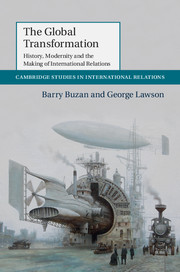Book contents
- Frontmatter
- Dedication
- Contents
- List of Figures
- List of Tables
- Preface
- List of Abbreviations
- Introduction
- Part I The Global Transformation and IR
- Part II The Making of Modern International Relations
- 3 Shrinking the Planet
- 4 Ideologies of Progress
- 5 The Transformation of Political Units
- 6 Establishing a Core–Periphery International Order
- 7 Eroding the Core–Periphery International Order
- 8 The Transformation of Great Powers, Great Power Relations and War
- Part III Implications
- Bibliography
- Index
6 - Establishing a Core–Periphery International Order
Published online by Cambridge University Press: 05 February 2015
- Frontmatter
- Dedication
- Contents
- List of Figures
- List of Tables
- Preface
- List of Abbreviations
- Introduction
- Part I The Global Transformation and IR
- Part II The Making of Modern International Relations
- 3 Shrinking the Planet
- 4 Ideologies of Progress
- 5 The Transformation of Political Units
- 6 Establishing a Core–Periphery International Order
- 7 Eroding the Core–Periphery International Order
- 8 The Transformation of Great Powers, Great Power Relations and War
- Part III Implications
- Bibliography
- Index
Summary
Introduction
During the nineteenth century, the core of the global transformation rested with European states and their settler colonies, with the addition during the latter part of the century of Japan. As discussed in the previous chapter, these states conducted a multiple assault on peoples around the world, undermining their institutions of governance, their modes of production and their legitimating ideologies (Abernathy, 2000: 1–12). The core states of the global transformation created an international ‘society of empires’ that subordinated indigenous people, sanctioning their dispossession and, on occasion, their genocide (Keal, 2003: 21, 35). The power inequality at the heart of this emergent core–periphery relationship was unprecedented in world history.
This chapter and the next augment the analysis of the previous chapter by charting the main components that underlay: (a) the emergence of a core–periphery international order; and (b) its partial erosion. In this chapter, we focus on the ways in which the gap between core and periphery was opened during the nineteenth century and more or less maintained until the middle of the twentieth century. Chapter 7 examines how this gap began to be reduced, mainly in the period after the Second World War, but sometimes earlier. If this chapter is about how modernity intensified both the uneven and combined aspects of historical development, the next chapter is about the ways in which the combined character of development has been enhanced even as its uneven aspect, particularly in relation to the distribution of power, has diminished. These two dynamics are closely intertwined – this is not a transformation in which a change arose autonomously in one place and was then exported to the rest of the system. The changes discussed here, as with those in the previous chapters, were constituted by interactions between the core and the periphery – the transformation to modernity was global from the beginning and remains so today. Analysing the global dimensions of modernity is what IR has to contribute to debates about modernity in Sociology and World History. But our concern here is somewhat different – to establish the implications of the global transformation for how IR understands itself and its subject matter.
- Type
- Chapter
- Information
- The Global TransformationHistory, Modernity and the Making of International Relations, pp. 171 - 196Publisher: Cambridge University PressPrint publication year: 2015

